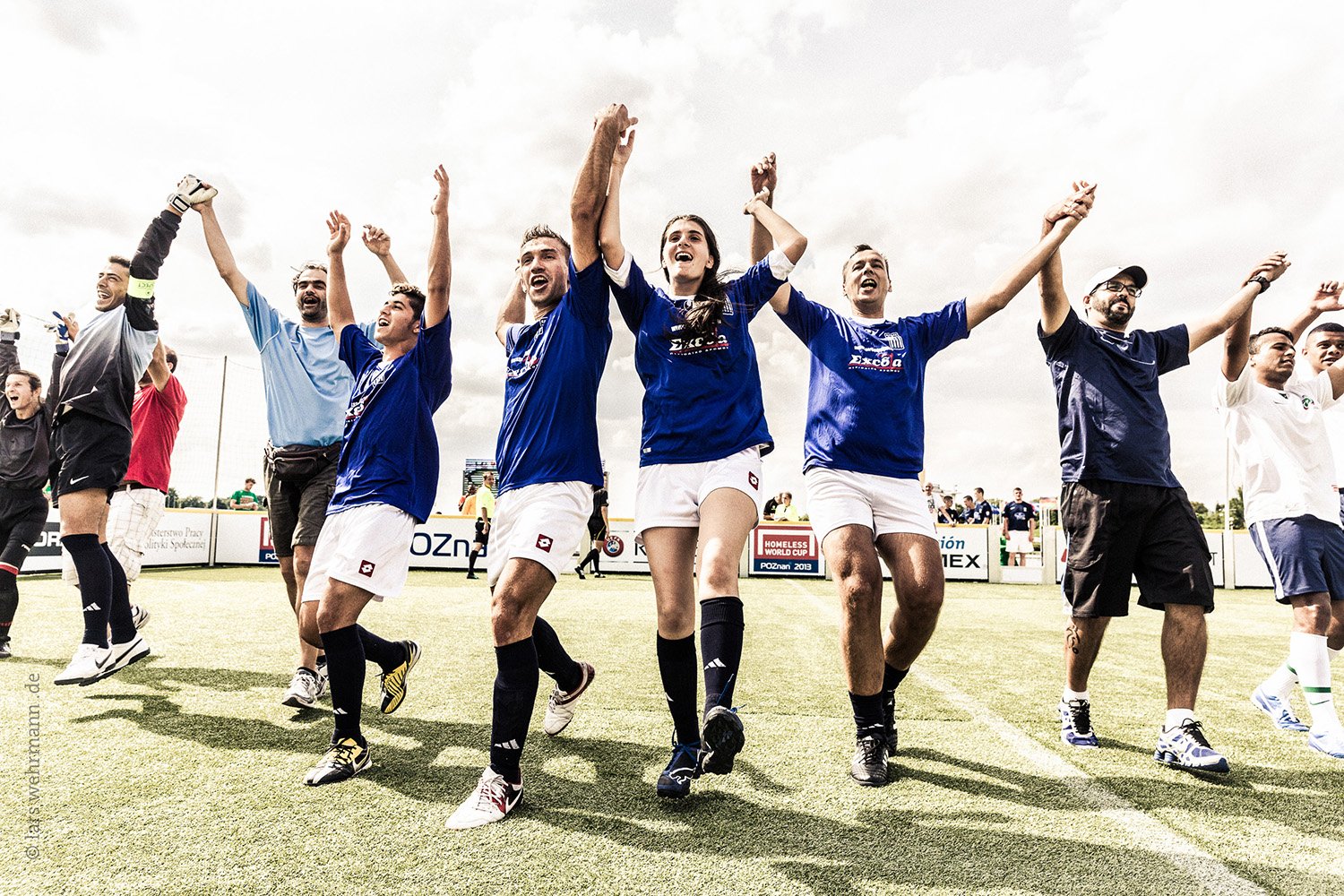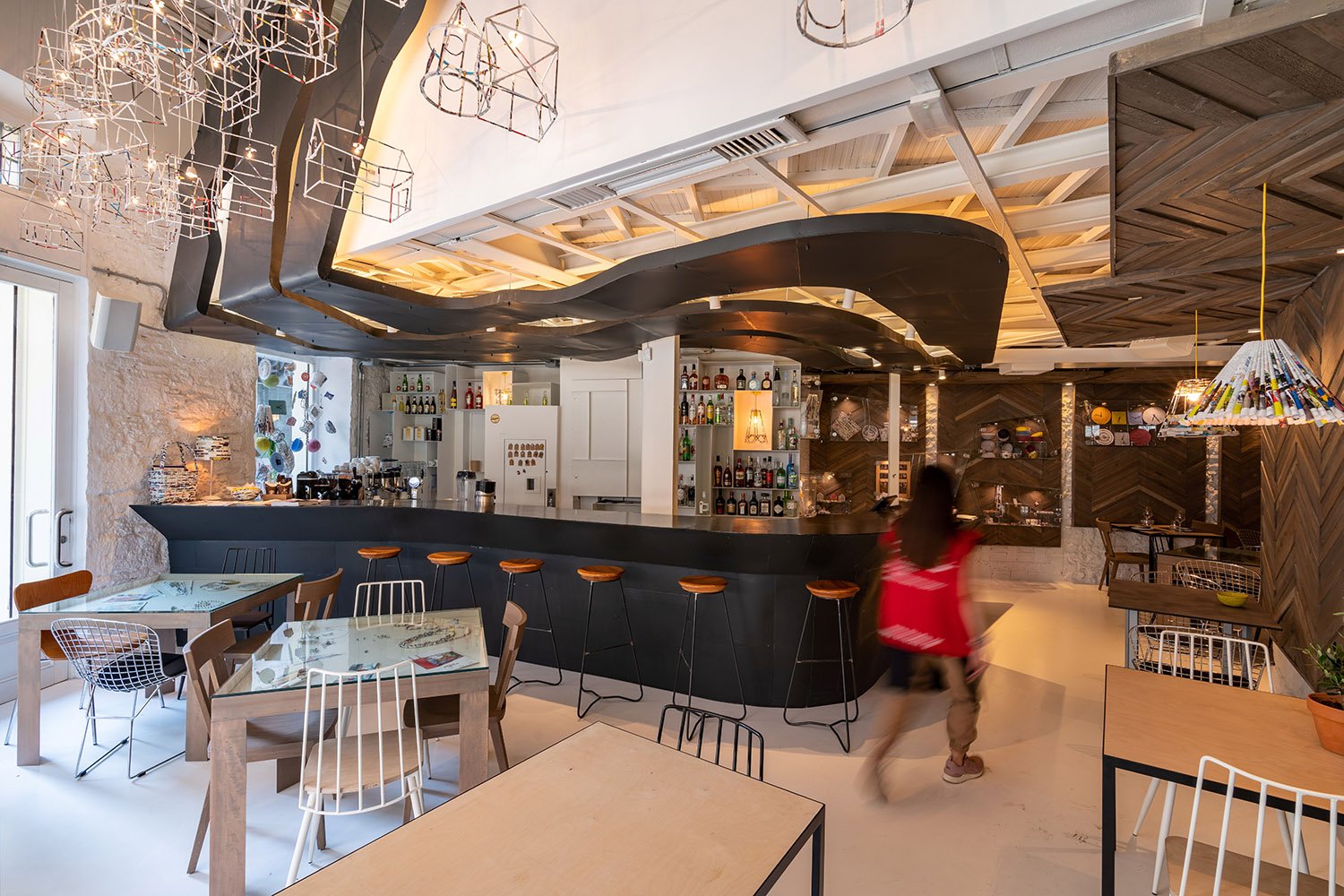Celebrating 10 years of Greek street paper ‘Shedia’ which grew from a football team and became a restaurant and a shop
|Greece have competed at the Homeless World Cup since 2007. Image: Lars Wehrmann
We spoke to founder Chris Alefantis and Programme Manager and Social Worker Akis Maragkozakis about the last ten years and what the future has in store.
Chris Alefantis holds up a magazine to the screen on our Zoom call; “This is Shedia,” he then holds up a clock “This is Shedia too.”
|None of Shedia’s remaining copies are recycled, instead they are upcycled into new items and sold in their shop. Image: Gavrii Lux
“A magazine, no matter whether it is Shedia, or Cosmopolitan or Der Spiegel or the New Yorker, if they have any unsold copies, they are sent to be recycled. In Shedia, we never send a single copy to be recycled. Instead, we store them. Seven years ago in March 2016, we invited Shedia vendors over 50 years old, to participate in free upcycling workshops.”
The upcycling workshops turned into a catalogue of products ranging from lampshades to coasters to jewellery. They set up a workshop in central Athens and started to sell them. Continuously thinking of ways to expand, it wasn’t long until the shop grew too.
“In one of those endless Monday meetings one of us had the idea – if you go to a museum, or a gallery, there’s always a small coffee, snack or sandwich area attached to it. So, let’s do the same thing.”
There was only one problem, neither Chris, Akis nor any of the team had ever worked in hospitality before.
“The hospitality industry is really difficult, so we went to someone who knows.”
|Inside Shedia’s restaurant which sells ‘Mama’s recipes’
Image: Gavrii Lux
They didn’t just go to anyone; they went to leading Greek Michelin star chef Lefteris Lazarou and his associate Yiannis Ifandidis. The idea for the small café became a restaurant with “mama’s recipes” created by Lefteris himself, who not only created the menu but trained the first five cooks.
To be trained by a Michelin star chef, you normally need to have years of cooking experience under your belt or have access to a hefty sum to cover a course.
However, in March 2017, the first five chefs at Shedia’s new restaurant were recruited from their base of vendors and other social organisations using three rather unique criteria.
“The first was to be over 50 - which is really, really young - I’m 58 myself! Why is this? Because in this part of the world, and in many parts of the world – if you lose your job, it is almost impossible to get back into work.
|“Through the rigorous training, the trainees got themselves to a point where they can cook top quality dishes” - Chris Alefantis
“Second criteria was for them to have boiled an egg in their lifetime. We really didn’t care about them having any cooking skills, but we cared about criteria number three – desire to work,” founder of Shedia, Chris explained.
“Through the rigorous training provided by Lefteris, the trainees got themselves to the point where they can cook top quality dishes, have a job with us and have their lives back in their hands.”
The growth and expansion of Shedia in the last ten years is remarkable, what makes it more surprising is that Shedia started its life as a football team.
The Greek Homeless World Cup team
Since 2007, Chris has been bringing a Greek team to the Homeless World Cup. He first found out about the Homeless World Cup while he was living in Melbourne and read an article about the Australian side and their upcoming preparations for the 2005 tournament in Edinburgh.
As a journalist, Chris followed the story of the team, writing it up for one of the Greek Sunday papers. When he moved to Greece later that year, he started to work for a magazine in central Athens where opposite his office window each morning throughout winter he would see three people who were homeless climbing out of the window of a derelict building.
“That was an image I had every day. I didn’t know what to think. Who are these people? What are they doing there? What’s the background? Where do they shower? What’s the story?”
The following summer in 2006, the FIFA Men’s World Cup was held in Germany and Chris used it as an excuse to write about the Homeless World Cup again.
“Then the idea came to me – hold on, why don’t we form a football team for homeless people in Greece? So, I sent a message to the Homeless World Cup and here we are 16 years later talking about this amazing social sporting family which we are absolutely deliriously happy and privileged to be part of for all these years.”
“Becoming better people, not necessarily better footballers”
|Greece in action against Scotland at the Homeless World Cup in Santiago, Chile in 2014. Image: Elaine Livingstone
“It’s the story of our life that we are really hopeless football players, but our motto is that people play football to become better people and not necessarily better footballers. Our selection is based exclusively on social criteria. We want the attitude, the effort, how people are connecting with our team and our principles. We try to be as inclusive as possible.
“In Copenhagen, we finished close to last. There’s an ongoing joke in Shedia that Slovenia is our “worst nightmare” because they also turn up with a very social team and every year, they grab last place out of our hands on the last day. It’s about fun, it’s about connecting, it’s about being empowered and getting to know each other and making victories in life, not necessarily on the football field.”
Chris explains it’s not that the Greek team don’t care about the result, “What we say to our guys is that no matter if Miss Martha is 62 years old, Martha you are here as a footballer and we expect that you will do your very, very best.
“We go there to win but the reality is – you are 62, you have never played football in your life – you have been kicking the ball for four to five months with us – you have these amazing Mexican children who were born with a football on their feet so the chances are that they will kick our butts but that’s ok!”
|Shedia now have between 120 - 150 vendors selling the magazine in Athens and Thessaloniki. Image: Giorgos Vitsaropoulos
How street paper Shedia began and became an overnight success
During the first Homeless World Cup, Chris met the team at the International Network of Street Papers (INSP) and explained he was a journalist. He’d been a keen reader of Big Issue Australia and after hearing how it worked, a spark was lit.
“I was absolutely sure that one day in Greece, we will also publish a street magazine and six years later in March 2013, Shedia hit the streets of Athens.”
But the night before the paper was published and sold for the first time, Chris was nervous.
“I was really stressed and worried about how people were going to respond. Were they going to embrace the people? Were they going to attack them? I felt really protective about our vendors because it was a complete unknown, but it happened from minute one, literally the people were embraced.”
Shedia became an overnight success, the first magazine sold out in two and a half weeks, selling 5,000 copies. Within three months they were selling 10,000 copies. Within two years it was up to 30,000 copies. Now Shedia is the largest selling Greek monthly magazine, even though it’s only sold in Athens and Thessaloniki.
In 2023 as they celebrate their 10th year, Shedia have a network of between 120-150 vendors selling the magazine in both cities.
“We want people to have desires again. We want them to want things other than the very basics and essentials.”
“Our vendors are all direct victims of the socio-economic crisis, they had a job, they lost their job and eventually they lost everything.
“Our people, no matter whether they sell a magazine in Athens or make a moussaka in our kitchen or earrings in our upcycling workshop, they don’t ask for pity or a favour, they ask for an opportunity and this is what we try to provide.
“They are across all age groups from 18 – 74, across all occupational backgrounds, we have many unskilled people who were the first victims of the socio-economic crisis but through Shedia we have seen accountants, civil engineers, architects, graphic designers, and of course small and medium businessmen and women who lost everything in the crisis.”
Despite official figures showing that unemployment rates have fallen in Greece, Chris and Akis explain that “the harsh reality is that the socioeconomic crisis, like all crises, left behind victims that will never recover.”
They are determined that through Shedia, they will help people to not just survive, but to be able to live full lives again.
Programme Manager and Social Worker Akis explains, “When you lose everything, it’s not like you just lose your home, your job, it’s also that you are deprived of your social identity. You loved to play sport, but now you can’t play sport. You used to love music and now you can’t play music because you have to survive. So, we try to find a way to help people to reconstruct their social identity, to reintegrate back into their social life and regain what they have lost completely.”
Chris adds, “We want people to have desires again. We want them to want things other than the very basics and essentials.”
For the team at Shedia, it’s about helping people to rediscover what makes life brilliant, rather than what makes life possible.
In July at the Homeless World Cup in Sacramento, the Greek team will once again be out on the pitch and while they might not be winning every day on the pitch, they are all getting a much more significant victory – a chance for a better life.
Find out more about Shedia and their programmes supporting people in Greece who have been victims of the Greek socio-economic crisis and refugees who have moved to the country.
Words: Rebecca Corbett
Images: Lars Wehrmann, Elaine Livingstone, Gavrii Lux, Giorgos Vitsaropoulos






